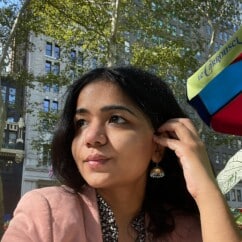Mahak Agrawal
2024 Fellow

Focus Areas
Mahak Agrawal is an urban planner, climate science and sustainability expert, global thought leader, and LinkedIn Top (Green) Voice. She is also a former United Nations fellow. Mahak earned her second master’s in public administration with a specialization in environmental science and policy as a Shardashish Scholar and Environmental Fellow at Columbia University’s School of International and Public Affairs. While there, Mahak led the research project examining the future of food systems through its demand-supply chains.
She earned her first master’s degree in urban planning from the School of Planning and Architecture Delhi, India. She is a recognized expert in the fields of climate policy, ESG reporting and corporate carbon management, urban sustainability, and social impact.
Recognized for her achievements in accelerating the Sustainable Development Goals in India through public health initiatives, Mahak was nominated for the Gates Foundation’s 2021 Goalkeepers Global Goals Award. In various capacities, she has worked with the Organisation for Economic Co-operation and Development (OECD); the Ministry of Home Affairs and the Ministry of Housing and Urban Affairs, the Government of India, the UN Environment Programme (UNEP), the World Bank Group, European Climate Foundation, and the Institute of Transport Economics, Oslo.
Mahak has served twice as an expert reviewer for the United Nations Intergovernmental Panel on Climate Change (IPCC), authored numerous scientific publications, and presented her works globally, including at the United Nations. She is a Steering Board Member of the ITA Committee on Underground Spaces (ITACUS) and a TEDx fellow. In 2023, ITACUS nominated Mahak to represent the organization at the World Food Forum.
She also experiments with her mum to create sustainable art advocating for climate action and a sustainable future.
“As a visionary leader, Mahak advocates for sustainable solutions that transcend borders and sectors, catalyzing change for a resilient and equitable future.”